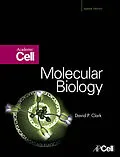Molecular Biology: Academic Cell Update provides an introduction to the fundamental concepts of molecular biology and its applications. It deliberately covers a broad range of topics to show that molecular biology is applicable to human medicine and health, as well as veterinary medicine, evolution, agriculture, and other areas. The present Update includes journal specific images and test bank. It also offers vocabulary flashcards. The book begins by defining some basic concepts in genetics such as biochemical pathways, phenotypes and genotypes, chromosomes, and alleles. It explains the characteristics of cells and organisms, DNA, RNA, and proteins. It also describes genetic processes such as transcription, recombination and repair, regulation, and mutations. The chapters on viruses and bacteria discuss their life cycle, diversity, reproduction, and gene transfer. Later chapters cover topics such as molecular evolution; the isolation, purification, detection, and hybridization of DNA; basic molecular cloning techniques; proteomics; and processes such as the polymerase chain reaction, DNA sequencing, and gene expression screening. - Up to date description of genetic engineering, genomics, and related areas - Basic concepts followed by more detailed, specific applications - Hundreds of color illustrations enhance key topics and concepts - Covers medical, agricultural, and social aspects of molecular biology - Organized pedagogy includes running glossaries and keynotes (mini-summaries) to hasten comprehension
Autorentext
David P. Clark did his graduate work on bacterial antibiotic resistance to earn his Ph.D. from Bristol University, in the West of England. During this time, he visited the British Government's biological warfare facility at Porton Down and was privileged to walk inside the (disused) Black Death fermenter. He later crossed the Atlantic to work as a postdoctoral researcher at Yale University and then the University of Illinois. David Clark recently retired from teaching Molecular Biology and Bacterial Physiology at Southern Illinois University which he joined in 1981. His research into the Regulation of Alcohol Fermentation in E. coli was funded by the U.S. Department of Energy, from 1982 till 2007. From 1984-1991 he was also involved in a project to use genetically altered bacteria to remove contaminating sulfur from coal, jointly funded by the US Department of Energy and the Illinois Coal Development Board. In 1991 he received a Royal Society Guest Research Fellowship to work at Sheffield University, England while on sabbatical leave. He has supervised 11 master's and 7 PhD students and published approximately 70 articles in scientific journals. He has written or co-authored several textbooks, starting with Molecular Biology Made Simple and Fun (with Lonnie Russell; (Cache River Press, First edition, 1997) which is now in its fourth edition. Other books are Molecular Biology and Biotechnology (both published by Elsevier) He recently wrote a popular science book, Germs, Genes, & Civilization: How Epidemics Shaped Who We Are Today (2010, Financial Times Press/Pearson). David is unmarried, but his life is supervised by two cats, Little George and Mr Ralph.
Klappentext
Molecular Biology: Academic Cell Update provides an introduction to the fundamental concepts of molecular biology and its applications. It deliberately covers a broad range of topics to show that molecular biology is applicable to human medicine and health, as well as veterinary medicine, evolution, agriculture, and other areas. The present Update includes journal specific images and test bank. It also offers vocabulary flashcards.
The book begins by defining some basic concepts in genetics such as biochemical pathways, phenotypes and genotypes, chromosomes, and alleles. It explains the characteristics of cells and organisms, DNA, RNA, and proteins. It also describes genetic processes such as transcription, recombination and repair, regulation, and mutations. The chapters on viruses and bacteria discuss their life cycle, diversity, reproduction, and gene transfer. Later chapters cover topics such as molecular evolution; the isolation, purification, detection, and hybridization of DNA; basic molecular cloning techniques; proteomics; and processes such as the polymerase chain reaction, DNA sequencing, and gene expression screening.
- Up to date description of genetic engineering, genomics, and related areas
- Basic concepts followed by more detailed, specific applications
- Hundreds of color illustrations enhance key topics and concepts
- Covers medical, agricultural, and social aspects of molecular biology
- Organized pedagogy includes running glossaries and keynotes (mini-summaries) to hasten comprehension
Inhalt
1. Basic Genetics
2. Cells and Organisms
3. DNA, RNA and Protein
4. Genes, Genomes and DNA
5. Cell Division and DNA Replication
6. Transcription of Genes
7. Protein Structure and Function
8. Protein Synthesis
9. Regulation of Transcription in Prokaryotes
10. Regulation of Transcription in Eukaryotes
11. Regulation at the RNA Level
12. Processing of RNA
13. Mutations
14. Recombination and Repair
15. Mobile DNA
16. Plasmids
17. Viruses
18. Bacterial Genetics
19. Diversity of Lower Eukaryotes
20. Molecular Evolution
21. Nucleic Acids: Isolation, Purification, Detection, and Hybridization
22. Recombinant DNA Technology
23. The Polymerase Chain Reaction
24. Genomics and DNA Sequencing
25. Analysis of Gene Expression
26. Proteomics: The Global Analysis of Proteins
Glossary
Index
